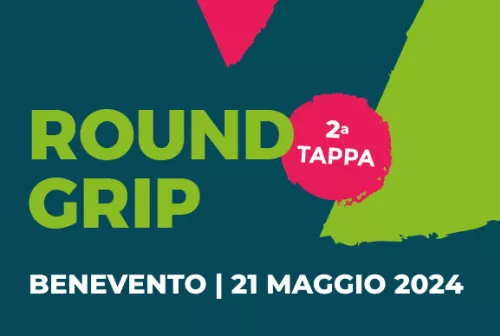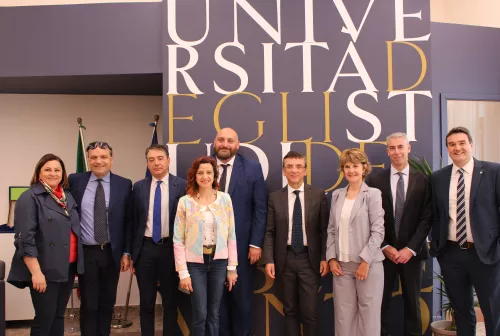Round GRIP 2nd stop - how did it go?

On 21 May 2024, a delegation from Spoke 2 was a guest of the University of Sannio in Benevento, a partner from the South, in order to expand synergies and visit the research infrastructure.
The event took place in the UNISANNIO Rectorate building, where the first part of the day was dedicated to the ‘public (dis)value of energy communities and waste collection processes’. In attendance were representatives of numerous local realities who attended a presentation of the NODES Ecosystem by Dr. Edoardo Braccio - Spoke 2 Project Manager - and of Spoke 2 activities by Prof. Cristina Prandi - Full Professor of Organic Chemistry at the University of Turin and Spoke 2 Coordinator.

Afterwards, several speeches took turns starting with Dr. Maria Carmela Serluca - Budget Councillor of the Municipality of Benevento - who explained how crucial the role of Public Administration is in the energy transition, being responsible for the creation of public value through the improvement of social welfare. Indeed, PAs must efficiently manage resources, plan and evaluate objectives and performance, and serve as a model for private individuals. There are regulatory and operational challenges to be faced, but they become surmountable thanks to Energy Efficiency Plans (Paee), the Central Public Administration Energy Redevelopment Programme (Prepac) and public-private partnerships.
The Municipality of Benevento, for example, thanks to the BeneClima Plan, presents itself as an advanced example of sustainable planning, aiming at both emission reduction and carbon neutrality, while also actively involving the private sector.
The BeneClima strategy identifies the following 10 fields of action:
- Detailed planning
- Community branding, communication, involvement and awareness-raising
- Mobility
- Construction
- Industry and enterprise
- Power generation, storage, distribution
- Heating and Biomass
- Resilience and Adaptation
- Circular Economy and Food
- Research and Living LAB

Dr. Donato Madaro, Sole Director of the Azienda Servizi Igiene Ambientale ASIA BENEVENTO S.p.a., then presented the path towards the energy transition and the improvement of waste management in the city of Benevento, emphasising the development of differentiated waste collection, the feasibility of the transition from TARI to TARIP - the Punctual Waste Tariff - and the renewal of the vehicle fleet. Benevento is among the most virtuous municipalities in Campania, reaching 70% separate waste collection. A number of projects were then presented, including TRUST, financed by Ecosistema NODES thanks to funds from the Line A Mezzogiorno calls for tenders.
The TRUST project aims to integrate the TARIP system with advanced fleet management and environmental monitoring solutions, enabling dynamic optimisation of collection routes, reducing time, energy consumption and CO2 emissions.
Three lecturers from the University of Sannio then spoke: Prof. Marco Consales, Prof. Eugenio Zimeo and Prof. Maurizio Sasso. In particular, Prof. Sasso focused on the fundamental role of Renewable Energy Communities in promoting sustainable energy. RECs are, in fact, legal entities that operate with the aim of achieving environmental, economic and social benefits, rather than financial ones. Their main objectives include increasing energy efficiency, reducing greenhouse gas emissions and combating energy poverty. Furthermore, these communities promote a democratic management model and the direct involvement of citizens, facilitating the sharing of energy resources and the implementation of distributed polygeneration technologies. Finally, CERs play a crucial role in achieving the objectives of the National Climate Energy Plan and the European Green Deal.

In the afternoon, activities continued with visits to various research facilities:
- the RCOST Research Centre on Software Technology of the Department of Engineering where some researchers and Prof. Zimeo illustrated the computer architecture of the TRUST project and the dynamics that led to the transition to TARIP;
- the nZEB - Nearly Zero Energy Building, a full-scale demonstrator intervention of the SMART CASE research project, ‘Innovative Multi-functional Solutions for the oTtimisation of primary energy consumption and indoor liveability in the Building System’ of the STRESS Technological District, in collaboration with UniSannio, currently inhabited by two PhD students from the university;
- the LAMAS, a laboratory for experimental research and advanced teaching in the area of civil engineering with special reference to earthquake engineering, geotechnics and hydraulic construction.

